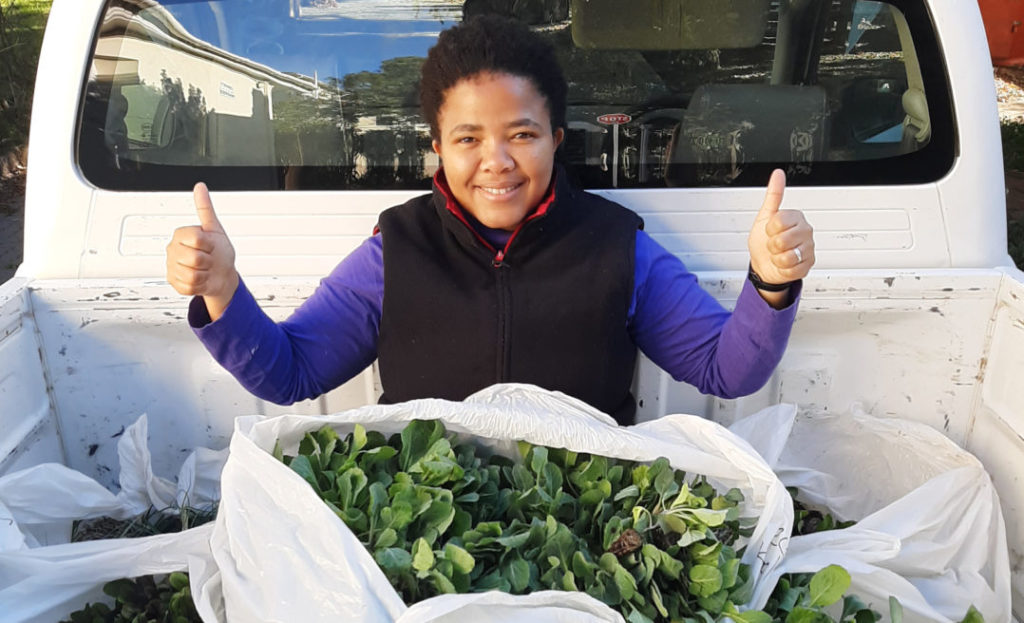By ISIPHO NGUTYANA, RENEE MOYO and TOLERATE CHILOANE
Tuesday mornings are as busy as they come for Nosi Nkwinti. She can spare us just 30 minutes, so we try to expand that window by driving to work with her.
She’s busy because she works in Makhanda, and this has been a volatile place for the past couple of years. People like Nosi ensure that the university’s community engagement activities run as efficiently as possible despite the upheaval – and that takes a lot of doing.
Nosi joined Rhodes University Community Engagement (RUCE) in 2012 and now holds the position of Senior Programme Coordinator. She attributes her love of community engagement to two things: her passion for social sciences and her personal experience of once being a part of the disadvantaged community of Makhanda.
“I thought: let me come back home and see where I fit best and what I can offer to the community,” she explains. More than anything, it is building relationships that drive her. “I can’t say that there is one particular initiative that’s especially close to my heart. It’s the effect of seeing the growth that comes with our programs. Seeing that growth and development within individuals that’s what warms me.”
Although the pandemic has disrupted community engagement activities, Nosi assures us that the work can continue in safe and fruitful ways. “We are living in a new normal, and we have to adjust to that. We’ve taken all the precautions; limited numbers, social distancing, and sanitising.”
The most recent initiative that Nosi decided to join is the COVID-19 vaccination programme. False information about the vaccine has spread rapidly and left some citizens of Makhanda on the fence about vaccination. On this matter, Nosi thinks that everyone should be well informed, but no one should be forced.
While she is pro-vaccination and is even vaccinated herself, she acknowledges a widespread problem of misinformation that could hinder many from taking the step. “It is important to bring the information to the people the right way,” she says. For one thing, there’s the language barrier. She highlights the importance of distributing educational information in a language that can be well-understood by a majority of the community – in this case, isiXhosa.
“At the end of the day, it is the community of Makhanda that we are trying to enlighten. The language that we choose to use when informing the majority of the community determines whether we inform effectively or not.” Nosi thinks this is where media platforms like Grocott’s and RMR can step in, with more informative segments in isiXhosa to ensure everyone is reached. Nosi’s vision for this extends beyond simple information about the vaccine. She wants to see a variety of subjects addressed, everything from mental health to building a self-sufficient community and computer literacy for all.
This last initiative is one that Nosi intends to lead. “I have noticed that the older generation is having a harder time adjusting to online work, and I think that students can step in here to help them.” She intends to initiate this program by loaning organisations tablets and sending in volunteers to help employees navigate online work and improve their computer literacy. Plans like this reflect her earlier sentiments of wanting to fill the gaps she sees throughout her community.
This kind of engagement is ingrained in Rhodes University culture, with many students participating in different programmes each year. One such student is Lukhanyiso Cezula, current SRC Community Engagement Councillor. Alongside Nosi, Lukhanyiso also answered the call to take part in the vaccination program. His views echo Nosi’s, particularly on the digital divide in Makhanda: “It’s important to make sure that no one is left out of the vaccination process, but sometimes this happens because people don’t always have access to information.”
For Lukhanyiso, this is one of the hindrances to vaccine education. “I think that promotion, explanation, and education is quite an important thing, especially to disadvantaged communities.” Regardless of the challenges that the pandemic has introduced, community engagement has not stalled. If anything, these stumbling blocks have sparked meaningful discourse around language diversity in the media, inclusivity, and access to information. Developments in these areas could further strengthen the bonds already created within the community.
Strengthening these bonds is what keeps Nosi on the go. Our time is up, and she’s on to the next thing.


